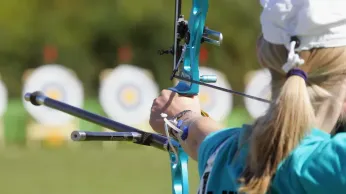
8 hours ago
Archery GB Bars Trans Women from Female Competitions Amid National Sports Policy Shifts
READ TIME: 3 MIN.
Transgender women will soon be banned from competing in the women’s category at most archery events in the United Kingdom, according to a policy unveiled by Archery GB on July 16, 2025. The decision, which aligns with a wave of similar measures from other British sports governing bodies, has sparked debate about inclusion, fairness, and the evolving landscape of athletics rights for transgender people in the UK .
The policy states that "Archery is a gender-affected sport" and reserves the women’s category for athletes who were assigned female at birth, effectively excluding transgender women from female competitions at both elite and grassroots levels . An open category will be created to accommodate transgender participants, aligning with approaches seen in other UK sports such as cycling and triathlon .
Archery GB’s announcement follows a series of policy changes across British sport after an April 2025 UK Supreme Court ruling. The Court determined that, under the Equality Act, the term ‘woman’ refers exclusively to individuals assigned female at birth . This ruling has significantly influenced how sports governing bodies interpret and implement eligibility criteria.
In recent months, major organizations—including the Football Association (FA), British Rowing, the England and Wales Cricket Board, and British Cycling—have introduced or reinforced similar bans on transgender women in female categories . The FA’s policy shift, which took effect in June 2025, explicitly cited the Supreme Court’s decision as the basis for restricting women’s football to those assigned female at birth .
LGBTQ+ advocacy groups and community members have expressed concern that such bans erode hard-won progress toward inclusion and recognition for transgender athletes. Critics argue that the new restrictions risk further marginalizing a group already facing significant barriers to participation in sports and public life . Many point out that transgender athletes represent a tiny fraction of participants in UK sports, and call for solutions that balance fairness with the right to compete authentically.
A statement from Archery GB noted that the policy is designed “to ensure fairness and safety in competition,” echoing justifications used by other sports governing bodies . However, trans athletes and their allies have countered that such blanket bans may reinforce stigma and exclusion, and that a nuanced, evidence-based approach is needed.
The introduction of open categories—while intended to provide opportunities for transgender athletes—raises questions about visibility, competitive parity, and the practicalities of implementation. Experiences from other sports suggest that open categories often attract limited participation, highlighting the ongoing challenge of making sport accessible to all .
This policy shift is part of a larger debate playing out not only in the United Kingdom but also internationally, as sports organizations grapple with questions of sex, gender identity, and fairness. The World Athletics, World Aquatics, and several other international federations have enacted similar eligibility rules in recent years, often citing competitive advantage and the integrity of female sport as key concerns .
As the UK continues to redefine its approach to the participation of transgender people in sport, advocacy groups are calling for comprehensive engagement with affected communities and for policy decisions rooted in both scientific evidence and respect for human rights. The debate over eligibility in women’s categories is likely to continue, with implications for the future of LGBTQ+ participation and inclusion in British sport.






